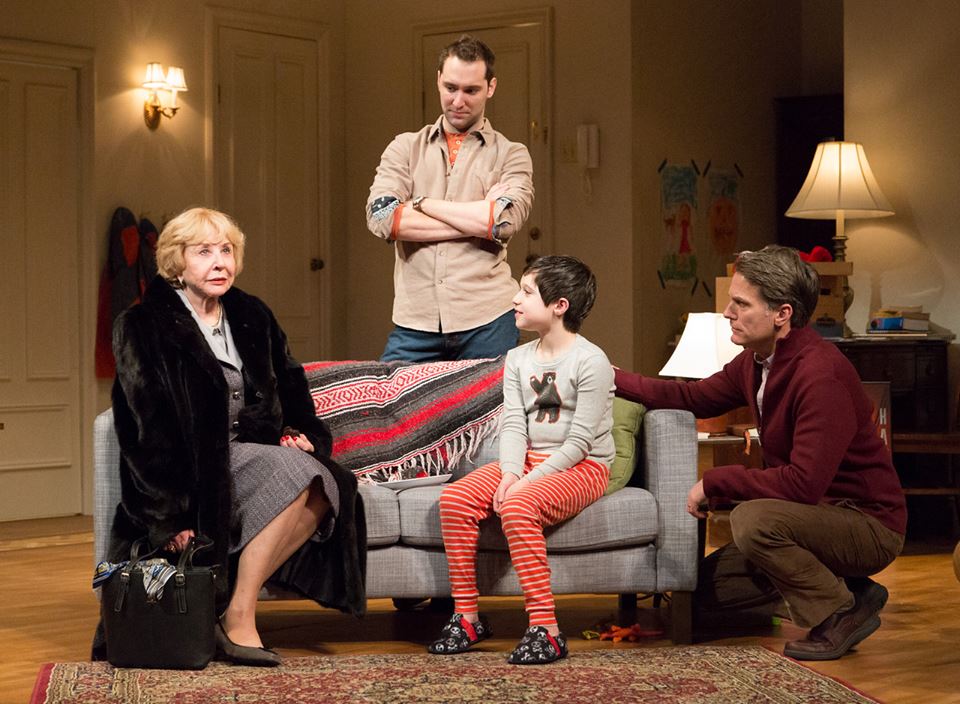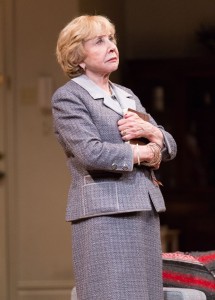
David Mamet once wrote: “Plays which deal with the unassailable investigate nothing and express nothing save the desire to investigate nothing.”
Terrance McNally’s MOTHERS AND SONS—playing now through March 8 at Philadelphia Theater Company—is not a play so much as a debate, a history lesson, a PSA. Its subterranean themes—of generational misunderstanding, of identity crises, of love and loss—are potential dramatic goldmines that wind up buried under a compost heap of ideological bickering and soapboxing. It is another in the tradition of dramatic works that bend over backwards trying to convince an audience of the rightness of something it already agrees with.
MOTHERS AND SONS consists of a single, uninterrupted scene of action in which a widowed septuagenarian named Katherine (Michael Learned) pays a visit to the Central Park West apartment of the fifty-ish Cal (James Lloyd Reynolds). The two seem uncomfortable together, and we soon learn why: they are forever connected by the death twenty years earlier of Andre, who was Katherine’s son and Cal’s longtime boyfriend. Katherine’s sadness at her son’s passing is almost secondary to her outrage at the disease that brought him down. Even two decades removed, she has no interest in the invented concept of “closure,” but instead wants revenge—revenge against whoever gave her son AIDS.
Cal remains in mourning for Andre and for so many of his friends who similarly fell to the AIDS holocaust, and much of the play is about the advances gained by the LGBT community in the intervening decades. Cal has a husband, Will (Hugh Kennedy), and a son, Bud (played on alternating nights by Patrick Gibbons, Jr., and Jacob Wilner). That in itself is nothing remarkable in a contemporary context, but could you imagine such terms being applied in 1994? The age difference not only between Katherine and Cal but between Cal and Will adds some depth of understanding here: Will—who is fifteen years Cal’s junior—cannot imagine the horror of the early days of the AIDS epidemic; Cal is amused and sort of surprised by how comfortable he is with the word “husband”; Katherine, of course, can’t understand any of this and still insists that either New York or Cal or theater or something must have “turned” her son gay.

But the progress is less interesting to McNally, whose play is regrettably backward-looking. More interesting to him are long scenes in which Cal or Will explain to Katherine that homosexuality is not wrong, that AIDS was a terror and not a punishment, that people do not “turn” gay. These are not the materials of drama, but of politics and common sense. There’s no complex, layered conflict for the audience to sink its teeth into, just some well-worn platitudes for us to nod in agreement with. Wouldn’t a more constructive message be sent by creating gay characters who function as something other than symbols?
The problems, for the most part, are with the text and not with PTC’s competent production. Michael Learned looks strong at 75 and does her best with a part lacking almost entirely of depth. Reynolds has the strong chin and Lincolnian profile of Kyle MacLachlin, and his discomfort at straddling the generational high wire that separates Katherine and Will is palpable.
Kennedy is all charm, yet sadly he often has nowhere to go with it. I wonder what we are supposed to gain from MOTHERS AND SONS. I doubt anyone who doesn’t already agree with its message is accustomed to treading the aisles of Philadelphia’s major theaters—or any theaters, for that matter. There’s nothing new here. McNally’s play neither provokes nor confronts nor transgresses. It simply berates and opines, inspiring the audience to respond, “I agree. So what?” [Suzanne Roberts Theatre, 480 S. Broad Street] February 6 through March 8, 2015; philadelphiatheatrecompany.org.
